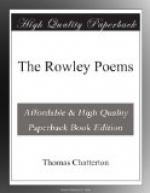Tapre as candles layde at
Cuthberts shryne,
Tapre as elmes that Goodrickes
abbie shrove,
Tapre as silver chalices for
wine,
So tapre was her armes and
shape ygrove.
As skyllful mynemenne by the
stones above 435
Can ken what metalle is ylach’d
belowe,
So Kennewalcha’s face,
ymade for love,
The lovelie ymage of her soule
did shewe;
Thus was she outward form’d;
the sun her mind
Did guilde her mortal shape and all her
charms refin’d. 440
What blazours then, what glorie
shall he clayme,
What doughtie Homere shall
hys praises synge,
That lefte the bosome of so
fayre a dame
Uncall’d, unaskt, to
serve his lorde the kynge?
To his fayre shrine goode
subjects oughte to bringe 445
The armes, the helmets, all
the spoyles of warre,
Throwe everie reaulm the poets
blaze the thynge,
And travelling merchants spredde
hys name to farre;
The stoute Norwegians had
his anlace felte,
And nowe amonge his foes dethe-doynge
blowes he delte. 450
As when a wolfyn gettynge
in the meedes
He rageth sore, and doth about
hym slee,
Nowe here a talbot, there
a lambkin bleeds,
And alle the grasse with clotted
gore doth stree;
As when a rivlette rolles
impetuouslie, 455
And breaks the bankes that
would its force restrayne,
Alonge the playne in fomynge
rynges doth flee,
Gaynste walles and hedges
doth its course maintayne;
As when a manne doth in a
corn-fielde mowe,
With ease at one felle stroke full manie
is laide lowe. 460
So manie, with such force,
and with such ease,
Did Adhelm slaughtre on the
bloudie playne;
Before hym manie dyd theyr
hearts bloude lease,
Ofttymes he foughte on towres
of smokynge slayne.
Angillian felte his force,
nor felte in vayne; 465
He cutte hym with his swerde
athur the breaste;
Out ran the bloude, and did
hys armoure stayne,
He clos’d his eyen in
aeternal reste;
Lyke a tall oke by tempeste
borne awaie,
Stretchd in the armes of dethe upon the
plaine he laie. 470
Next thro the ayre he sent
his javlyn feerce,
That on De Clearmoundes buckler
did alyghte,
Throwe the vaste orbe the
sharpe pheone did peerce,
Rang on his coate of mayle
and spente its mighte.
But soon another wingd its
aiery flyghte, 475
The keen broad pheon to his
lungs did goe;
He felle, and groand upon
the place of fighte,
Whilst lyfe and bloude came
issuynge from the blowe.
Like a tall pyne upon his
native playne,
So fell the mightie sire and mingled with
the slaine. 480




